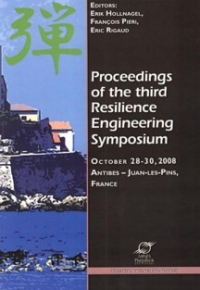

Proceedings of the third resilience engineering symposium
Argumentaire
The proceeding from Third Resilience Engineering Symposium collects the papers presented on October 28-30, 2008, in Antibes-Juan-les-Pins, France.The Symposium provided a much appreciated forum for people working within the area of Resilience Engineering to become updated with the latest scientific achievements as well as more practical oriented applications, and exchange views and idea within the area.
Resilience Engineering represents a new way of thinking about safety that has already given rise to several practical applications. In contrast to established risk management approaches that are based on hindsight and emphasise error tabulation and calculation of failure probabilities, Resilience Engineering looks for ways to enhance the ability of organisations to create processes that are robust yet flexible, to monitor and revise risk models, and to use resources proactively in the face of disruptions or ongoing production and economic pressures. In Resilience Engineering failures do not stand for a breakdown or malfunctioning of normal system functions, but rather represent the converse of the adaptations necessary to cope with the real world complexity. Individuals and organisations must always adjust their performance to the current conditions; and because resources and time are finite it is inevitable that such adjustments are approximate. Success has been ascribed to the ability of groups, individuals, and organisations to anticipate the changing shape of risk before damage occurs; failure is simply the temporary or permanent absence of that.
The First Resilience Engineering Symposium was held in Söderköping, Sweden, on October 25-29 2004. The Second Resilience Engineering Symposium was held in Juan-les-Pins, France, on November 8-10 2006. The current and future developments in Resilience Engineering will be covered by the Ashgate Studies in Resilience Engineering.

